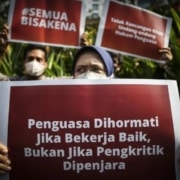
Supreme Court Justice Gazalba Saleh, at the Corruption Court in Jakarta on 6 May 2024. Photo by Muhammad Adimaja for Antara.
In late May 2024, Indonesia’s Anti-corruption Commission (KPK) began prosecuting former Supreme Court Judge Gazalba Saleh in the Central Jakarta District Court. It indicted him for taking a bribe of around Rp 650 million to overturn a businessperson’s conviction and one-year prison sentence (for failing to properly manage hazardous waste his company produced).
On the surface, there appeared to be nothing unusual about this case. The KPK has successfully pursued dozens of Indonesian judges, including from the Supreme Court, among several hundred officials from other government institutions. Saleh’s lawyers lodged an eksepsi (challenge to the indictment) in the preliminary stages of his trial. The main claim in his eksepsi was that the KPK did not have the power to prosecute him. This, he argued, was because power to prosecute lies with the public prosecution, not the KPK. And, while the prosecution could delegate power to the KPK to prosecute, it had not done so in this case. Again, there is nothing unusual about a defendant lodging an eksepsi. Defendants routinely make these challenges, including in corruption cases, but often on a wing and a prayer; they are almost never successful. Defendants in previous cases have even made the same arguments in their eksepsi as Saleh, and have lost.
However, the decision the three judges handed down in Saleh’s case was anything but usual. They unanimously accepted his eksepsi, holding that KPK prosecutors had no authority, because they could not prove that they had received delegation to prosecute him from the Attorney General. It was not enough that the KPK’s own Director of Prosecution had authorised them to prosecute the case. The judges ordered his immediate release from the KPK detention centre where he had been held for several months.
While controversial, the decision was not entirely devoid of legal reasoning. In it, the Court pointed to Article 35(1)(j) of the Prosecution Law, which had been inserted as an amendment in 2021. This provision says that ‘The Attorney General has the task and authority to delegate a part of [his or her] authority to prosecute to public prosecutors to perform prosecutions’. The Elucidation to Article 35(1)(j) says that ‘The tasks and authority of the public prosecution in criminal cases is determined by taking into account the single prosecution system…The delegation of prosecutorial authority from the Attorney General to public prosecutors must accord with the policy of law enforcement that has been stipulated by the Attorney General as the sole holder of prosecutorial authority.’ [my emphasis]
On the other hand, the Court referred to various provisions of the KPK Law that referred to the prosecutorial powers of the KPK. For example, the Court said that Article 51 of the KPK Law says that KPK prosecutors, who are to be appointed and dismissed by the KPK itself, are to exercise prosecutorial functions in corruption cases. However, the Court did not mention various provisions that seem intended to grant independent prosecutorial powers to the KPK. For example, Article 3 states that the KPK is an independent authority that must be free from any influence. Taken together, Articles 3 and 51 seem to provide the KPK with prosecutorial powers that are not dependent on any outside institution, including the Attorney General.
Implications
The implications of Article 35(1)(j) seem clear: the Attorney General is the centre of prosecutorial power in Indonesia. To prosecute in criminal cases, officials (including prosecutors themselves, whether in the public prosecution or in the KPK) need to receive a delegation of power from the Attorney General. There is no other source of power to prosecute and attempts to prosecute without delegation are illegal. The judges in Saleh’s case asserted that this interpretation should now apply to all prosecutions in Indonesia, including the KPK’s (p. 65).
Article 35(1)(j) was amongst several other provisions in the 2021 amendments to the Prosecution Law. Its dangers did not draw as much attention from civil society or condemnation by KPK leaders as they deserved. Certainly, to my knowledge, no one openly predicted that it might be used this way. In retrospect, however, it seems akin to a Trojan horse, inserted via the amendments for future deployment by a defendant, to further weaken the KPK’s authority, or both.
Why the provision lay dormant for three years until the Saleh case is unclear. Indeed, KPK Deputy Chairperson Nurul Ghufron has pointed out that the same three judges who decided Saleh’s case had recently convicted other defendants in KPK prosecutions. In those cases, they had not questioned whether the public prosecution had delegated prosecutorial power to the KPK. Here, it might be worth noting that Saleh has been implicated in other cases, including one involving Supreme Court judge Sudrajad Dimyati. The allegations against him in these cases have not stuck, with the Supreme Court ultimately exonerating him on appeal. Regardless, Saleh’s case means that the KPK’s future lies in the Attorney General’s hands. The result is dire, remembering that the very reason why the KPK was established as an independent institution in the first place was to insulate it from the nefarious practices of public prosecutors (and other law enforcers).
The KPK has said that it will appeal. It must. But any hopes of success must be tempered. After all, the appeal will ultimately be decided by the institution upon which Saleh previously served – the Supreme Court.










 https://commons.wikimedia.org/wiki/File:ASEAN_HQ_1.jpg
https://commons.wikimedia.org/wiki/File:ASEAN_HQ_1.jpg